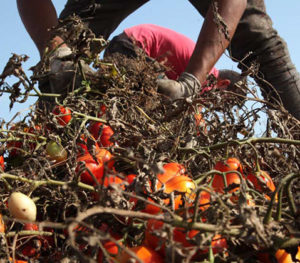The truth behind Italy’s agricultural exports
Next time you think about buying a tin of Italian tomatoes instead of a slightly more expensive Australian produced competitor, think twice.
Much of Italy’s agricultural exports are underpinned by the exploitation and coercion of migrant labourers as well as inhuman working and living conditions.
According to the Observatory Placido Rizzotto, an organisation which investigates working conditions in Italian farming, there up to 500,000 migrant workers in Italy’s agricultural sector, around half of its total workforce.
And the Observatory says 80 per cent of these have no work contracts, a situation that has been exploited by Italian farmers since the 1970s, when migrants first started to arrive.
And now, right-wing Deputy Prime Minister and Interior Minister Matteo Salvini’s new immigration-security decree will accelerate the illegalisation of asylum seekers and push more people further into irregular work without any labour protection.
Humanitarian protection, granted to African asylum seekers in previous years, will end.
United Nations human rights official Urmila Bhoola, reported last year that “migrant farm workers in parts of southern Italy are enduring extreme levels of labour exploitation and coercion, and inhuman working and living conditions”.
She singled out the Campobello region, in Italy’s south saying while the olive growing region absolutely needs African workers to harvest its produce, appropriate housing has never been provided by farmers – as Italian law requires – and Africans often cannot rent rooms in town, as a direct result of deep-seated racism.
“They are not even allowed to congregate in makeshift camps as they must be out of public sight. Instead, they are dispersed among derelict farmhouses and sheds, former petrol stations and abandoned factories, in unsafe conditions and lacking basic facilities such as water and electricity,” Ms Bhoola reported.
An Oxfam report into the issue said poverty was widespread among the small-scale farmers and workers who produce and process our food, in an industry worth billions of dollars.
It found “systemic inequality and human suffering” in food supply chains in Italy.
The report found workers regularly working a 12 hour day for just 25 Euro ($A 40) and that women workers were particularly vulnerable.
It also found evidence of: wages well below the legal minimum as indicated by national collective agreements; the systematic violation of working-time rules, including failure to grant daily breaks, weekly rest periods and annual holidays; unsafe and unhealthy working conditions; substandard housing and living conditions, with workers forced to live in dilapidated hovels, tent cities without heating, or shipping containers; excessive control of workers’ lives by employers, including the use of surveillance, or other abuses that exploit workers’ legal and social vulnerability; and, physical and verbal sexual harassment or violence faced by women workers.
“Non-payment of wages, as well as delayed and/or partial payment, is also very common,” the report says.
“Working conditions in the plastic greenhouses are extremely hard. Workers endure sweltering heat during the summer and low temperatures in the winter, all the while breathing in pesticides and herbicides that are harmful to health,” it says.
“Toilet or meal breaks are not guaranteed, and in any case must be very short.
“Seasonal agricultural workers, especially migrants, also have to suffer appalling housing conditions.
“Workers usually live in slums, or in disused buildings or factories in remote rural areas, without running water, electricity or heating,” the report said.
According to estimates by Placido Rizzotto Observatory, 60 per cent of irregular farm workers do not have access to clean water or sanitation services.
Trade union activists say Salvini’s plans will increase this exploitation and social degradation.
They say it will not only make the idea of offering protection redundant, but will force many migrants to leave Italy or stay as ghosts, living in hiding.
Laurie Nowell
AMES Australia












